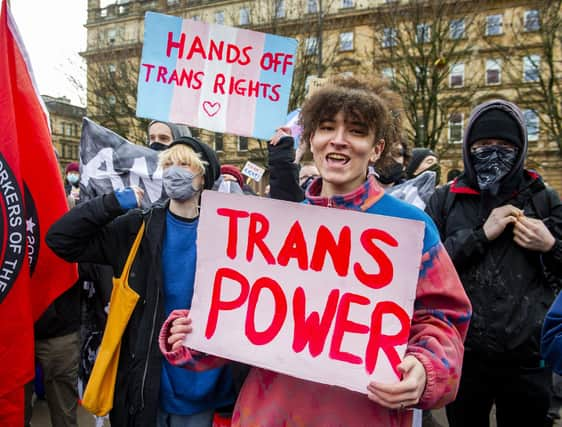Euan McColm: Hate Crime Act damaged from the start by influence of campaigners and weakness of Nicola Sturgeon


At six minutes past eight on the evening of Wednesday, January 27, 2021, Nicola Sturgeon posted a most remarkable video to social media.
In the clip – filmed on her phone – the then First Minister addressed news that a number of young SNP members had quit the party. “It grieves me, deeply,” she said, looking as if she was broadcasting from the broom cupboard in a foreign embassy, “that you’re reached this conclusion… because you consider at this stage the SNP not to be a safe, tolerant, or welcoming place for trans people.”
Advertisement
Hide AdAdvertisement
Hide AdSturgeon opened her filmed statement with a declaration that she was acting of her own volition, without the influence of spinners. Here she was, open, honest and caring – the real Nicola, all sad-eyes and wrung fingers. As performances in sincerity go, it was pretty much note-perfect.
Six weeks later, on March 11, 2021, members of the Scottish Parliament voted 82-32 (with four abstentions) to pass the Hate Crime and Public Order (Scotland) Bill.
The vote came after a frequently stormy debate in Holyrood. Labour MSP Johann Lamont tried – and failed – to amend the bill so that women would be included among the groups against whom “stirring up” hatred would become a crime under the new law.
Given the level of violent crime suffered by females – almost 15,000 Scottish women and girls were victims of sexual violence in 2022-23, while the year before, Police Scotland recorded almost 65,000 incidents of domestic violence – Lamont’s argument was hardly frivolous. But, in the end, those against whom “stirring up” hatred was to become an offence included groups based on age, disability, religion or – in the case of a social or cultural group – perceived religious affiliation, sexual orientation, transgender identity, and variations in sex characteristics, sometimes known as being intersex.
Hang on a minute. Does that mean that, until this new law was enacted, it was perfectly legal to stir up racial hatred?
Of course, it wasn’t. In fact, the groups offered protection under the new Act were already covered by sentencing guidelines that made them “aggravating factors”.
In advance of Sturgeon’s panic-driven message to young SNP activists, there had been an understanding across the parliament that the Scottish Government would accept an amendment including women as a category deserving of the protection of the new law. After, it was made clear to SNP MSPs that they’d be expected to reject such a move.
Last Monday – more than three years after MSPs voted it through – the new Hate Crime Act was implemented. Lawyers, police chiefs, opposition politicians, journalists, writers, free-speech campaigners were among those who raised concerns that the new law was open to abuse. Within hours, all had been proved correct. By Wednesday, Police had received more than 3,000 reports of hate crimes, many of them prompted by the decision of JK Rowling to challenge the legislation by identifying, online, a number of trans women as men.
Advertisement
Hide AdAdvertisement
Hide AdPolice quickly stated that Rowling had committed no crime. Her innocence had been irrelevant to all of those who tried to weaponise the law to shut her up.
To understand the flaws in the law, we have to consider Sturgeon’s decision back in 2021.
One SNP parliamentarian explains that the then First Minister was under pressure from both campaign groups – largely funded by her Government – and young SNP members to show her commitment to the cause of trans rights. The refusal of many women to accept the mantra that “trans women are women” had led a number to publicly challenge the demands of campaigners.
It was, say a number of Sturgeon’s former colleagues, this tension between trans rights activists and feminist campaigners that led Sturgeon to reject the inclusion of women in the new law.
“She had,” says one former colleague, “to do something just for those activists. It was total self-interest because they had been super-loyal to her and she was terrified of losing their support.”
But while rejecting the inclusion of women from the Hate Crime Act might have satisfied some activists, it planted the seed for much of the chaos that has engulfed its implementation.
By 2021, it had become commonplace for activists to report gender critical feminists to their employers and police if they spoke critically in public about the demands of trans rights campaigners.
It was hardly surprising that many of those women predicted the new law would be abused by those who wish to silence anyone challenging their ideology.
Advertisement
Hide AdAdvertisement
Hide AdWe are where we are, to a large degree, because the Scottish Government failed women – for entirely cynical reasons relating to Nicola Sturgeon’s desire to maintain her support base – in 2021 by excluding them from protection under the new Hate Crime Act.
In recent days, government ministers have pointed to an ongoing review of how the law should deal with crimes driven by misogyny. That is undoubtedly a worthwhile project but it doesn’t explain why women could not have been included in the legislation enacted last week.
Those who support the new act have frequently, over the past week, sought to paint its critics as bigots, as if those of us who see flaws in the legislation are driven by fear we won’t be able to stir up hatred against anyone (except, maybe, women). This cheap attack shouldn’t be allowed to cloud the truth which is that the Hate Crime Act is a flawed law, its creation damaged by the influence of campaigners and the weakness of the former First Minister.
All of us – including both gender critical feminists and trans rights activists – should oppose a law so clearly open to abuse that it'll be impossible to uphold.
Comments
Want to join the conversation? Please or to comment on this article.